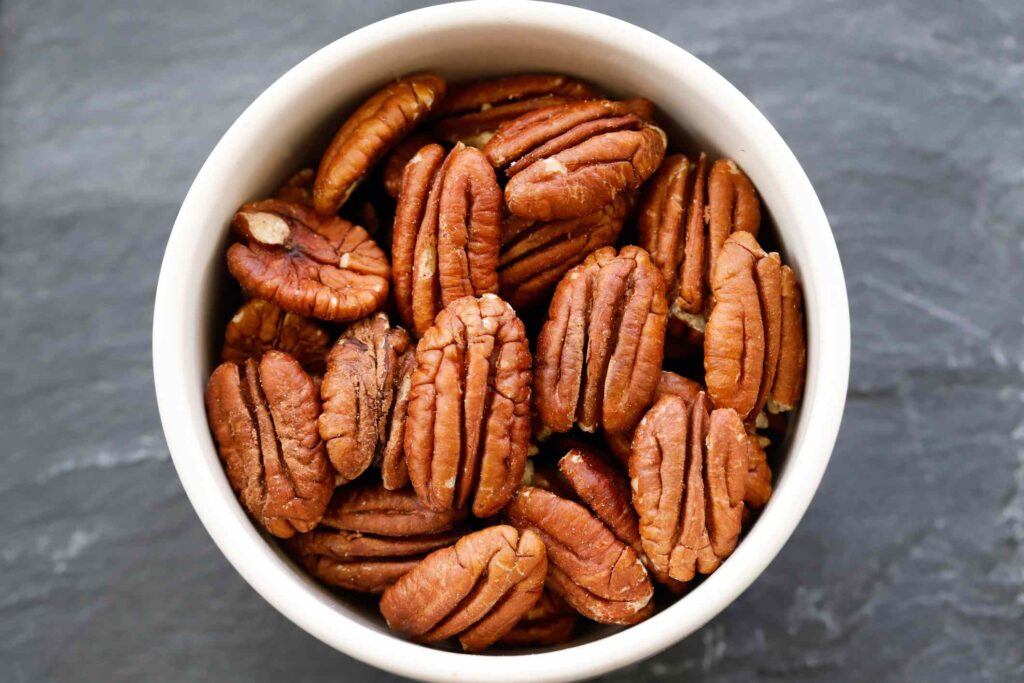With their buttery texture and subtly sweet taste, pecans are a go-to nut for snacking and baking pies, cakes, and other baked goods.
In addition to their culinary uses, pecans provide an array of health benefits thanks to their impressive mix of vitamins, minerals, fiber, antioxidants, and healthy fats.
Here’s what you need to know about the health benefits of pecans and how to add them to your diet in a balanced way.
Nuts, like pecans, are rich in heart-healthy nutrients, such as fiber, antioxidants, and monounsaturated and polyunsaturated fats. Eating pecans can improve heart health by lowering heart disease risk factors such as “bad” LDL cholesterol and reducing inflammation.
Studies show that regularly eating nuts, like pecans, can significantly reduce levels of LDL cholesterol and markers of inflammation, which can lower heart disease risk.
A 2025 study found that when participants replaced their usual snacks with 57 grams of pecans per day for 12 weeks, they experienced reductions in their total and LDL cholesterol and triglyceride levels compared to a control group that followed their normal diets.
Pecans provide nutrients and plant compounds that play important roles in brain health, such as healthy fats, vitamin E, B vitamins, zinc, and flavonoid antioxidants. These nutrients protect and support the brain by providing energy, reducing inflammation, and protecting against oxidative stress, which can contribute to cognitive decline.
Nut-rich diets have been associated with brain health benefits such as improved memory and a reduced risk of dementia.
A 2025 study that included over 50,000 adults found that people who ate nuts daily had a 12% lower risk of developing dementia over seven years compared to those who didn’t eat nuts. The strongest benefits were associated with unsalted nuts and servings of up to one handful (about 30 grams) per day.
Pecans provide a good source of fiber, with an ounce of these nuts packing 2.72 grams or 9.7% of your daily fiber needs.
Pecans provide both soluble fiber and insoluble fiber, which play important roles in gut health. Soluble fiber helps fuel beneficial gut bacteria and keeps stools soft and easier to pass, while insoluble fiber adds bulk to stools, supporting regularity.
Eating more nuts could help promote healthier bowel movements and may keep your gut microbiome healthy by reducing inflammation in the digestive tract and supporting the growth of beneficial gut bacteria.
Pecans are a rich source of antioxidants, and are especially high in flavonoids like flavan-3-ols and anthocyanins. In fact, pecans have one of the highest flavonoid concentrations of all nuts.
The flavonoids found in pecans have powerful cellular-protective properties, and studies show that following a diet rich in flavonoids could help protect against health conditions like heart disease, diabetes, cancer, cognitive decline, and early death.
Pecans also provide vitamin E, which is a fat-soluble vitamin that functions as an antioxidant in the body and also supports immune health.
Pecans are one of the lowest-carb nuts you can eat, containing just 3.94 grams of carbs per ounce. This makes them a nutritious choice for those following low-carb diets, like the keto diet.
Pecans are low in carbs and high in healthy fats, which is another plus for people following higher-fat, lower-carb diets. Their low carb content makes them a blood sugar-friendly food, with some studies showing that pecans may improve the body’s sensitivity to insulin, the hormone that shuttles blood sugar into cells where it can be used for energy.
A four-week study in adults with overweight and obesity found that following a pecan-rich diet that provided 15% of total calories from pecans for four weeks significantly improved insulin levels, insulin resistance, and the function of beta cells, the cells of the pancreas that produce and release insulin, compared to a control diet.
Some research also suggests that eating more nuts may reduce the risk of type 2 diabetes.
A major benefit of pecans is that they’re versatile, shelf-stable, and easy to incorporate into meals and snacks.
Here are a few simple and healthy ways to eat more pecans:
- Toss pecans on top of salads and grain dishes
- Use pecans to increase benefits of baked goods, like breads and muffins
- Add pecans to trail mix and homemade granola
- Fold chopped pecans into yogurt and oatmeal
- Pair pecans with fresh fruit for a balanced snack
- Use roasted pecans as a crunchy topping for soup
- Use crushed pecans as a breading for fish and chicken
- Fold pecans into pancake and waffle batter
Pecans are delicious in both sweet and savory dishes and can be enjoyed raw or roasted.
For the most benefits, add pecans to a diet that includes plenty of other nutritious foods, such as other nuts and seeds, fruits, vegetables, protein sources, and healthy fats.
Eating pecans regularly can improve the overall quality of your diet while benefiting your heart, brain, digestion, blood sugar, and more.
To get the most out of pecans, enjoy them in small amounts, such as a 1-ounce serving at a time, and pair them with other nutritious foods as part of a well-rounded diet.


